Key takeaways:
- Ethical fashion emphasizes social and environmental responsibility, promoting sustainable materials and fair labor practices.
- Supporting ethical brands fosters community connections and empowers consumers by highlighting transparency in the supply chain.
- Mindful consumerism through ethical fashion choices can enrich personal wardrobes and inspire others to reconsider their shopping habits.
- Various resources, such as websites and social media, can help consumers discover ethical fashion brands and practices.
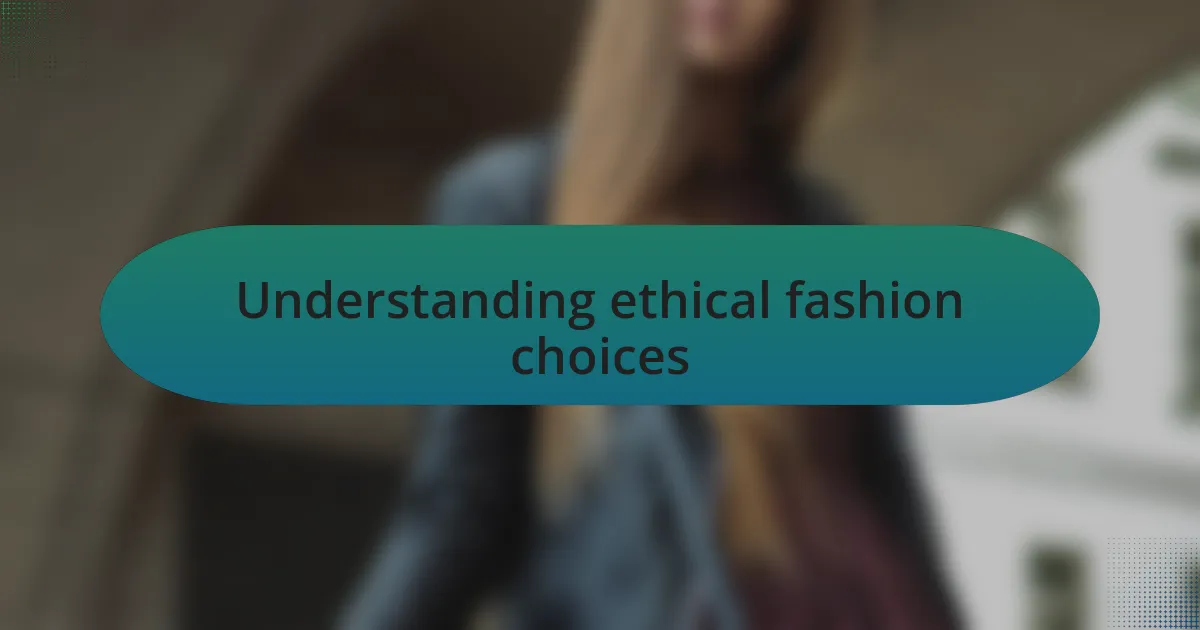
Understanding ethical fashion choices
Ethical fashion choices go beyond mere aesthetics; they encompass a commitment to social and environmental responsibility. I remember a time when I stumbled upon a local brand that sourced its materials from recycled fabrics. It sparked a realization in me about the impact our choices can have on the planet. How often do we consider the stories behind our clothes?
When I think about ethical fashion, I can’t help but reflect on my own shopping habits. I used to chase trends without a second thought, but then I learned about the exploitation often hidden in fast fashion. It made me wonder: isn’t it worth investing in pieces that not only look good but are also made with care?
One of the key aspects of ethical fashion is transparency in the supply chain. I once reached out to a small brand to learn about their production processes, and their openness was refreshing. If more brands operated like this, wouldn’t we all feel more connected to what we wear? It’s crucial to support those who prioritize fair wages and sustainable practices.

Importance of sustainable fashion
Sustainable fashion is vital because it addresses the urgent need to reduce our environmental footprint. I recall a shopping trip where I picked a beautifully crafted garment made from organic cotton. The moment I learned that cotton farming can be incredibly resource-intensive, I felt a sense of responsibility wash over me. How can we justify purchasing items that harm our planet when eco-friendly alternatives exist?
Moreover, sustainable fashion promotes social equity. I was deeply moved after reading about artisans who lost their livelihoods due to fast fashion chains undercutting their prices. Their stories made me realize the power of my dollar. Isn’t it incredible that every time we choose to support sustainable brands, we’re also supporting the livelihoods of talented individuals and communities?
Lastly, adopting a sustainable approach to fashion encourages mindful consumerism. I’ve found that when I invest in quality pieces that stand the test of time, my wardrobe becomes both functional and meaningful. Do you ever think about how many items we accumulate, only to wear them a few times? Embracing sustainability doesn’t just enrich our closets; it enriches our lives with purpose.
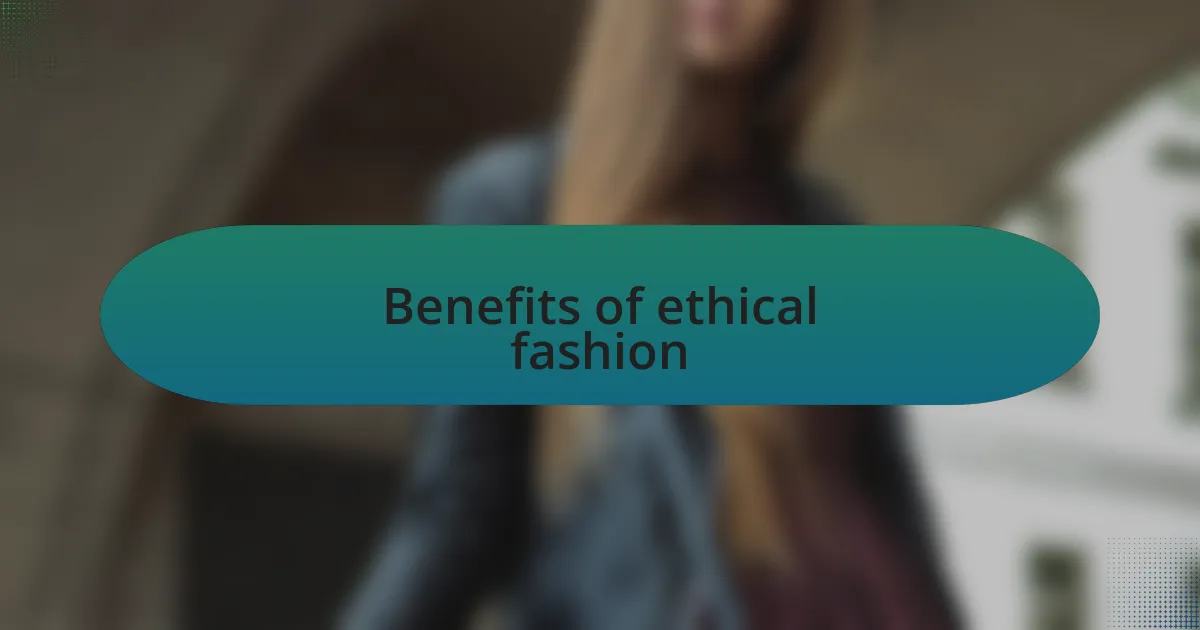
Benefits of ethical fashion
One significant benefit of ethical fashion is the positive impact it has on the environment. I vividly remember a weekend spent volunteering with an organization that works to clean up polluted waterways affected by textile waste. Seeing firsthand the damage caused by cheap, synthetic fabrics made me more conscious about the materials I choose to wear. Doesn’t it feel empowering to know that opting for sustainable options can help protect our planet?
Another advantage lies in how ethical fashion fosters a sense of community and connection. I once attended a local fair where artisans showcased their handmade clothing. The energy was palpable as creators shared stories behind their work, making every purchase feel personal. How often do we get to connect with the people behind our clothes? Supporting ethical brands not only feels good but enriches our appreciation for the craft and artistry involved in fashion.
Lastly, ethical fashion reflects a commitment to transparency and integrity in the industry. I remember finding myself captivated by a brand that openly shared its production processes and labor practices. It struck me that this level of accountability can lead to better working conditions and fair wages for workers. Isn’t it reassuring to wear something knowing it was made with care, both for the environment and the people involved?
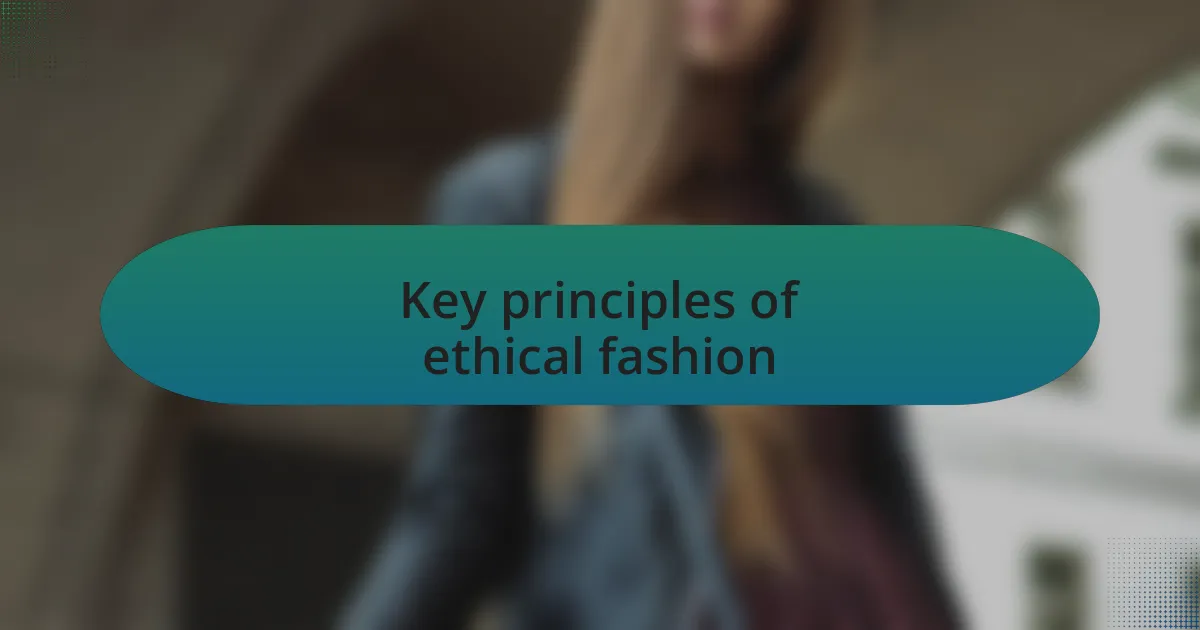
Key principles of ethical fashion
One key principle of ethical fashion is the commitment to sustainable materials. I vividly recall when I first discovered organic cotton while shopping for a new outfit. The fabric felt soft and breathable, but what truly captured my heart was learning that it was grown without harmful pesticides. Doesn’t it change the way we perceive our clothing when we know it supports both our skin and the earth?
Another essential principle revolves around fair labor practices. I once had a conversation with a designer about her dedication to ensuring that every garment is produced ethically. Hearing her speak passionately about fair wages and safe working conditions opened my eyes to the unseen struggles many laborers face. Isn’t it amazing how each garment carries a story and, when produced ethically, one of hope and fairness?
Lastly, the principle of transparency is vital in ethical fashion. I remember scrolling through a brand’s website and being impressed by their detailed supply chain disclosure. They didn’t just say their products were ethical; they showcased the journey from raw materials to finished attire. How reassuring it is to know the path our clothes take before they reach us, right? This kind of openness fosters trust and allows consumers to make informed choices.
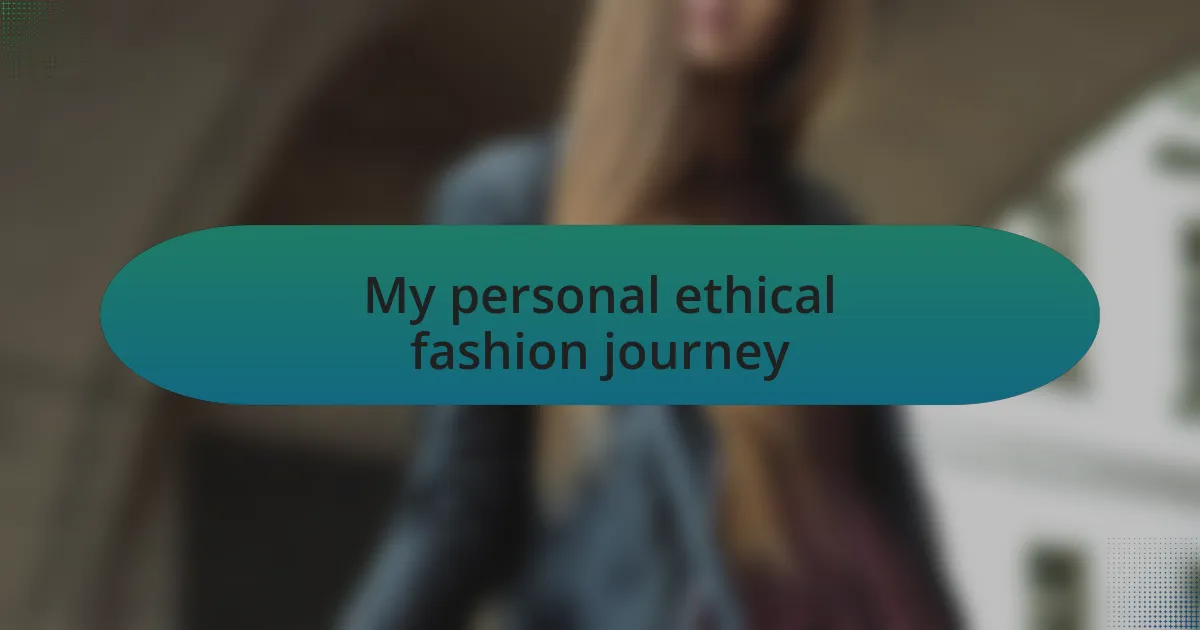
My personal ethical fashion journey
My ethical fashion journey began unexpectedly while sifting through my closet one Sunday afternoon. I stumbled upon a dress I had worn once, a beautiful piece from a fast fashion brand. As I held it, I couldn’t shake the feeling of guilt that had started to bubble inside me. I thought, how many times had I unwittingly supported an industry that sacrificed ethical standards for trends? That moment marked the turning point where I decided I needed to align my wardrobe with my values.
As I navigated this transition, I found myself gravitating towards thrift shops and local artisans. I can still recall the thrill of finding a vintage jacket that was unique and had its own story. There was something deeply satisfying about wearing a piece of clothing that had been loved before and would be cherished again. It made me wonder: isn’t fashion inherently about stories and connections, rather than just the act of buying something new?
The more I educated myself on ethical brands, the more empowered I felt. I remember sharing my newfound knowledge with friends over coffee, excitedly discussing the importance of supporting companies that prioritize ethical practices. Those conversations were enlightening, turning my journey into a community effort. I realized that making ethical choices isn’t just about individual impact—it’s about inspiring others to rethink their own fashion habits as well. How empowering it is to be part of a movement that champions positivity, sustainability, and conscious consumption?
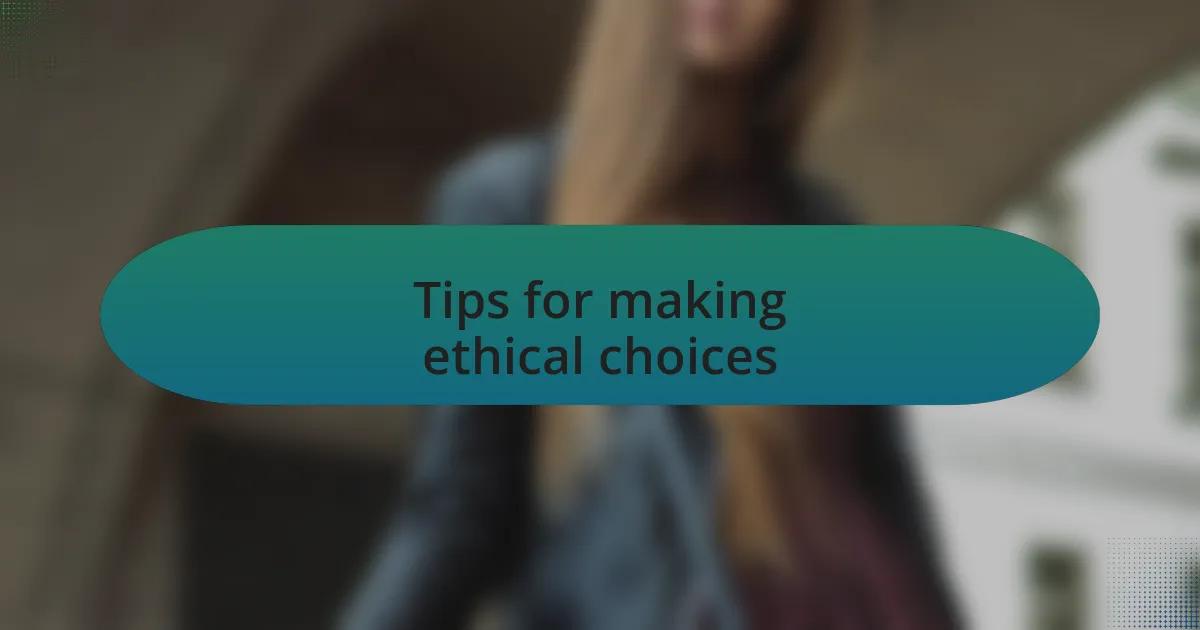
Tips for making ethical choices
When making ethical choices in fashion, start by researching brands that align with your values. I recall a time when I first began this research, discovering the stories behind companies that prioritize fair labor practices and sustainable materials. One day, I came across a brand that not only created beautiful clothing but also invested in its workers’ lives. This realization made me feel like my purchases could be a force for good—how incredible is that?
Another effective tip is to embrace the art of making do with what you have before seeking new items. I remember being tempted by seasonal trends, but one day I challenged myself to create five new outfits from my existing wardrobe instead. It was a fun exercise that rekindled my creativity and taught me to appreciate the pieces I already owned. Can you relate to that feeling of discovery when breathing new life into a long-forgotten item?
Lastly, don’t hesitate to engage in conversations about ethical fashion within your community. I found that sharing my journey at local meetups sparked meaningful discussions among friends and strangers alike. It was a revelation to see how many people are eager to learn and share their own experiences. How often do we underestimate the power of dialogue to inspire change?
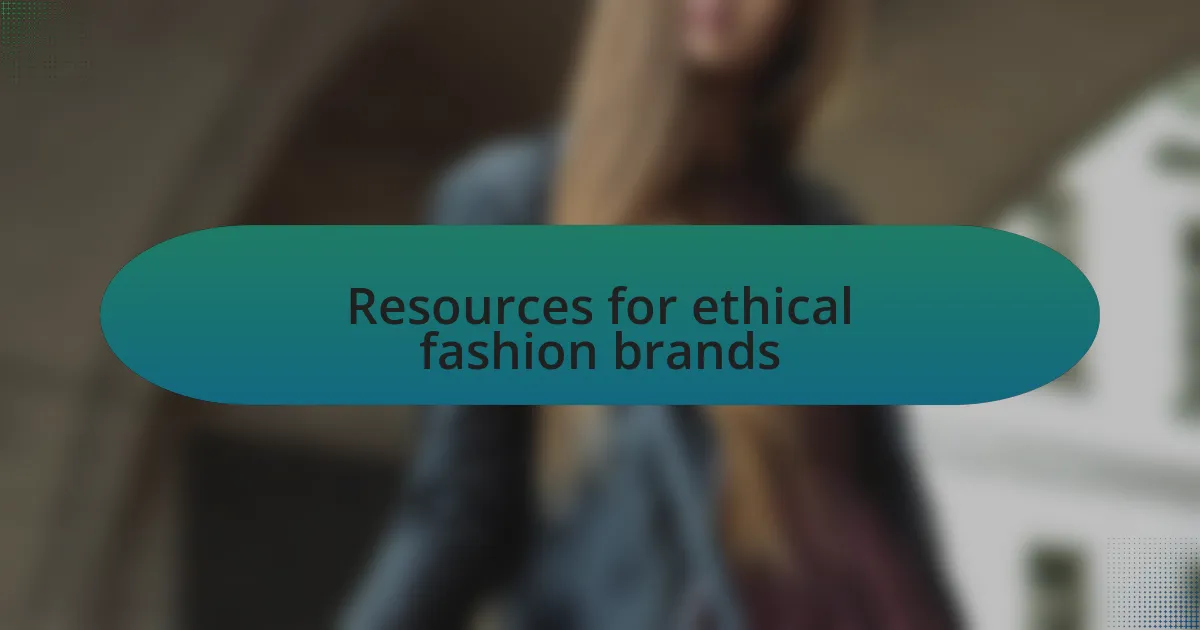
Resources for ethical fashion brands
Finding ethical fashion resources can feel overwhelming, but there are some great platforms out there. For example, I discovered the Good Trade, an incredible website that rates brands based on their ethical practices. When I first found it, I spent hours browsing through their comprehensive guides—talk about a treasure trove of information for conscious shoppers! Have you ever felt that rush of excitement when hitting a goldmine of knowledge?
Another valuable resource is Fashion Revolution, which encourages brands to be transparent about their supply chains. I remember attending one of their events and being blown away by the passion of the speakers. It really drove home the importance of understanding where our clothes come from. Isn’t it empowering to know that there are organizations actively pushing for change in the industry?
Lastly, social media can be a fantastic tool for uncovering ethical brands. I started following several influencers dedicated to sustainable fashion, and it opened my eyes to so many amazing options I had never heard of. Their posts often include behind-the-scenes looks at the brands they support, which adds a personal touch to my shopping experience. Have you ever considered how much influence your online community can have on your fashion choices?